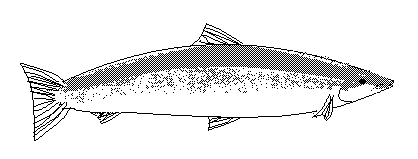Welcome to River Magic
Stillwater Slim on the Line ... November 24, 2009
|
 Understanding, respect, and the wild Atlantic salmon
Carl Purcell, President of the Nova Scotia Salmon Association wrote this report for our readers. I’m very happy that the Association is providing leadership in an endeavour we hope will lead to a new level of understanding and respect between aboriginal and non-aboriginal communities, to the benefit of all, including the Atlantic salmon.
“On Saturday, November 21st, the Nova Scotia Salmon Association hosted an “Aboriginal Day” for its directors and affiliates. The intent of the day was two-fold; to meet with DFO (our federal Dept. of Fisheries and Oceans) officials for the purpose of educating the angling community about the rights and regulations under which the First Nations community has a ceremonial and food fishery, and following that we met with a representative of the aboriginal community to learn first-hand the history and meaning to their right to this fishery.
The wild Atlantic salmon stocks in Nova Scotia are under stress. All the rivers flowing from the inner Bay of Fundy are listed under the “Species at Risk” program and are closed to both the aboriginal and sport fishing communities. Where once there were over 40,000 adult Atlantic salmon there are now less that 200 to spawn in 32 different rivers!
The rivers along the Atlantic side of mainland Nova Scotia are greatly impacted by acid rain and as a result, many of these rivers are devoid of salmon. Others are at the brink of extinction.
The angling community has a $5.00 conservation fee attached to each licence. This contributes over $220,000 annually to community and river groups to repair and protect river and riparian habitat. Coupled with this money are countless volunteer hours given to complete projects of river enhancement.
If we are to save the wild Atlantic salmon it is important that both the aboriginal and the angling communities work together to conserve, protect and, hopefully, find ways to increase the stock. Thus, the aboriginal community can exercise its right to a food and ceremonial fishery, and the angling community will have the privilege of a catch and release fishery. A “right” or a “privilege” is of no consequence if there are no fish in our rivers.
Hopefully, this meeting was an introduction to learning and education on both sides that will lead to more dialogue for the purpose of saving the species of wild Atlantic salmon.”
Carl R. Purcell, President, Nova Scotia Salmon Association Please stay on the line  |